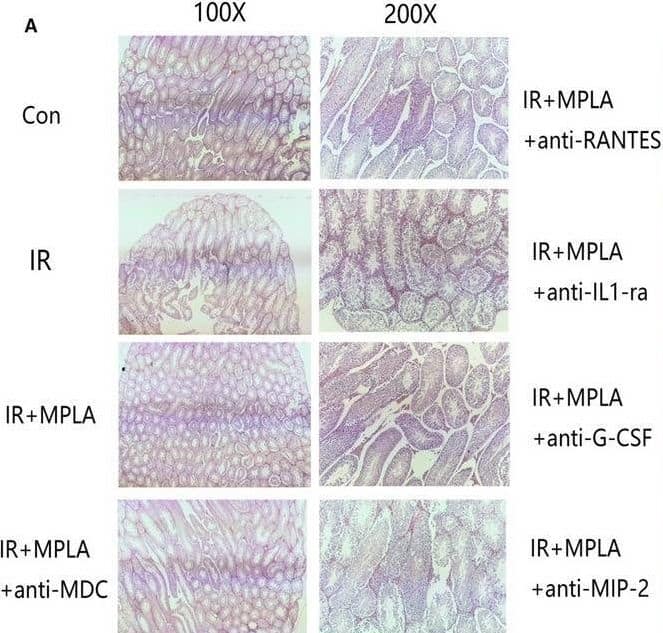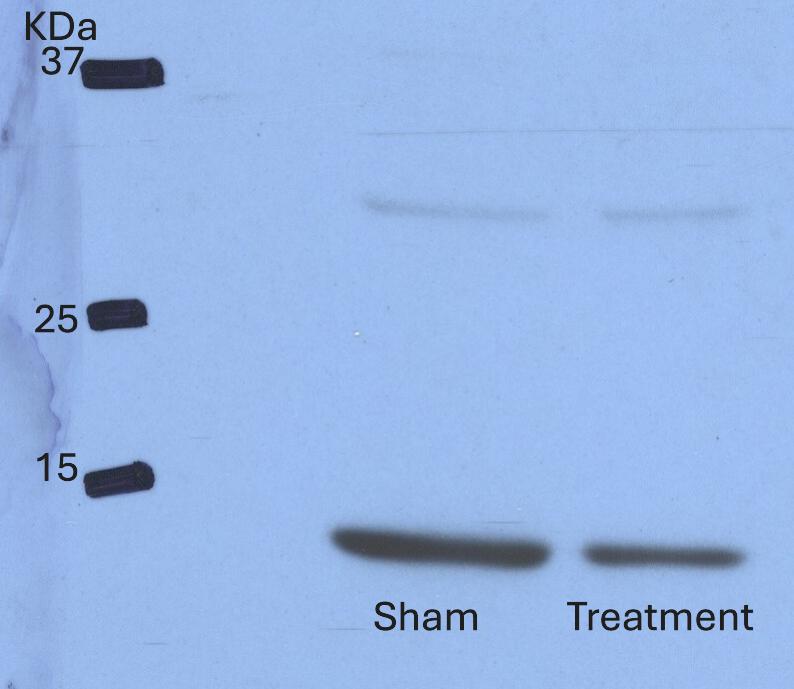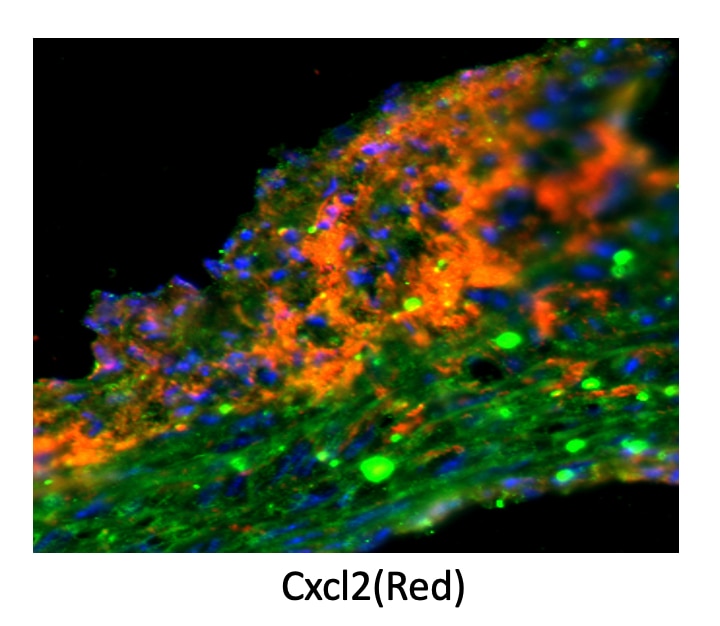Mouse CXCL2/GRO beta /MIP-2/CINC-3 Antibody Summary
Ala28-Asn100
Accession # P10889
Applications
under non-reducing conditions only
Mouse CXCL2/MIP-2 Sandwich Immunoassay
Please Note: Optimal dilutions should be determined by each laboratory for each application. General Protocols are available in the Technical Information section on our website.
Scientific Data
 View Larger
View Larger
Chemotaxis Induced by CXCL2/MIP‑2 and Neutralization by Mouse CXCL2/MIP‑2 Antibody. Recombinant Mouse CXCL2/MIP-2 (Catalog # 452-M2) chemoattracts the BaF3 mouse pro-B cell line transfected with human CXCR2 in a dose-dependent manner (orange line). The amount of cells that migrated through to the lower chemotaxis chamber was measured by Resazurin (Catalog # AR002). Chemotaxis elicited by Recombinant Mouse CXCL2/MIP-2 (2 ng/mL) is neutralized (green line) by increasing concentrations of Rat Anti-Mouse CXCL2/MIP-2 Monoclonal Antibody (Catalog # MAB452). The ND50 is typically 1-4 µg/mL.
 View Larger
View Larger
Detection of CXCL2/GRO beta /MIP-2/CINC-3 by Immunohistochemistry G‐CSF and MIP‐2 in exosomes were the main protection effectors in testis radiation protection. A, On day 7 after neutralizing antibody administration and 4 Gy irradiation, mice testis was isolated and subjected to H&E staining. B, Clonal formation assay was used to determine GC‐1 cell viability after exosomes treatment and irradiation exposure with or without neutralizing antibody. Data were presented as mean ± SD (n = 3). *P < .05. **P < .01, ***P < .001 Image collected and cropped by CiteAb from the following open publication (https://pubmed.ncbi.nlm.nih.gov/32135028), licensed under a CC-BY license. Not internally tested by R&D Systems.
Reconstitution Calculator
Preparation and Storage
- 12 months from date of receipt, -20 to -70 °C as supplied.
- 1 month, 2 to 8 °C under sterile conditions after reconstitution.
- 6 months, -20 to -70 °C under sterile conditions after reconstitution.
Background: CXCL2/GRO beta/MIP-2/CINC-3
Macrophage Inflammatory Protein-2 (MIP-2) was originally identified as a heparin-binding protein secreted from a murine macrophage cell line in response to endotoxin stimulation. Based on its protein and DNA sequences, MIP-2 is a member of the alpha (C-X-C) subfamily of chemokines.
MIP-2 cDNA encodes a 100 amino acid residue precursor protein from which the amino-terminal 27 amino acid residues are cleaved to generate the mature MIP-2. The protein sequence of murine MIP-2 shows approximately 63% identity to that of murine KC, another murine alpha chemokine whose expression is induced by PDGF. In addition, the protein sequence of MIP-2 is also 60% identical to human GRO beta and GRO gamma. It has been suggested that mouse KC and MIP-2 are the homologs of the human GROs and rat CINCs.
Similarly to other alpha chemokines, murine MIP-2 is a potent neutrophil attractant and activator. MIP-2 and KC can bind the murine interleukin 8 type B receptor homologue with high affinity. The expression of MIP-2 was found to be associated with neutrophil influx in pulmonary inflammation and glomerulonephritis, suggesting that MIP-2 may contribute to the pathogenesis of inflammatory diseases.
Product Datasheets
Citations for Mouse CXCL2/GRO beta /MIP-2/CINC-3 Antibody
R&D Systems personnel manually curate a database that contains references using R&D Systems products. The data collected includes not only links to publications in PubMed, but also provides information about sample types, species, and experimental conditions.
54
Citations: Showing 1 - 10
Filter your results:
Filter by:
-
NLRP3 activation induces BBB disruption and neutrophil infiltration via CXCR2 signaling in the mouse brain
Authors: Lee, J;Cho, W;Yu, JW;Hyun, YM;
Journal of neuroinflammation
Species: Mouse
Sample Types: Whole Cells
Applications: Bioassay -
hsa_circ_0007755 competitively adsorbs miR-27b-3p to mediate CXCL2 expression and recruit Th1 cells to promote hypertrophic scars development
Authors: Qi, J;Wu, Y;Liu, Y;Ma, J;Wang, Z;
Heliyon
Species: Human
Sample Types: Cell Lysates, Tissue Homogenates
Applications: Western Blot -
Pancreatic melatonin enhances anti-tumor immunity in pancreatic adenocarcinoma through regulating tumor-associated neutrophils infiltration and NETosis
Authors: Yau-tuen Chan, Hor-yue Tan, Yuanjun Lu, Cheng Zhang, Chien-shan Cheng, Junyu Wu et al.
Acta Pharmaceutica Sinica B
-
Schwann cell-derived CXCL2 contributes to cancer pain by modulating macrophage infiltration in a mouse breast cancer model
Authors: Y Zhang, R Sang, J Bao, Z Jiang, D Qian, Y Zhou, W Su, J Wei, L Zhao, Z Wei, Y Zhao, M Shi, G Chen
Brain, Behavior, and Immunity, 2023-02-06;0(0):.
Species: Mouse
Sample Types: In Vivo
Applications: Neutralization -
Age-associated adipose tissue inflammation promotes monocyte chemotaxis and enhances atherosclerosis
Authors: J Song, D Farris, P Ariza, S Moorjani, M Varghese, M Blin, J Chen, D Tyrrell, M Zhang, K Singer, M Salmon, DR Goldstein
Aging Cell, 2023-01-23;0(0):e13783.
Species: Mouse
Sample Types: In Vivo
Applications: Neutralization -
ARID1A loss induces polymorphonuclear myeloid-derived suppressor cell chemotaxis and promotes prostate cancer progression
Authors: N Li, Q Liu, Y Han, S Pei, B Cheng, J Xu, X Miao, Q Pan, H Wang, J Guo, X Wang, G Zhang, Y Lian, W Zhang, Y Zang, M Tan, Q Li, X Wang, Y Xiao, G Hu, J Jiang, H Huang, J Qin
Nature Communications, 2022-11-26;13(1):7281.
Species: Mouse
Sample Types: Whole Cells
Applications: Neutralization -
PD-L1 negatively regulates antifungal immunity by inhibiting neutrophil release from bone marrow
Authors: Y Yu, RR Wang, NJ Miao, JJ Tang, YW Zhang, XR Lu, PY Yan, J Wang, XM Jia
Nature Communications, 2022-11-11;13(1):6857.
Species: Mouse
Sample Types: In Vivo
Applications: IHC -
Age-related changes in the local milieu of inflamed tissues cause aberrant neutrophil trafficking and subsequent remote organ damage
Authors: Anna Barkaway, Loïc Rolas, Régis Joulia, Jennifer Bodkin, Tchern Lenn, Charlotte Owen-Woods et al.
Immunity
-
Marginal Zone B Cells Assist With Neutrophil Accumulation to Fight Against Systemic Staphylococcus aureus Infection
Authors: Li-Wen Lo, Chia-Wei Chang, Ming-Feng Chiang, I-Ying Lin, Kuo-I Lin
Frontiers in Immunology
-
Neutrophils Enhance Their Own Influx to Sites of Bacterial Infection via Endosomal TLR-Dependent Cxcl2 Production
Authors: Germana Lentini, Agata Famà, Carmelo Biondo, Nastaran Mohammadi, Roberta Galbo, Giuseppe Mancuso et al.
The Journal of Immunology
-
Early growth response 1 deficiency protects host against Pseudomonas aeruginosa lung infection
Authors: Z Pang, R Raudonis, C McCormick, Z Cheng
Infect. Immun., 2019-12-17;0(0):.
Species: Mouse
Sample Types: BALF
Applications: ELISA Capture -
Distinct Compartmentalization of the Chemokines CXCL1 and CXCL2 and the Atypical Receptor ACKR1 Determine Discrete Stages of Neutrophil Diapedesis
Authors: Tamara Girbl, Tchern Lenn, Lorena Perez, Loïc Rolas, Anna Barkaway, Aude Thiriot et al.
Immunity
-
Modulation of double-stranded RNA pattern recognition receptor signaling in ovarian cancer cells promotes inflammatory queues
Authors: M Muccioli, H Nandigam, T Loftus, M Singh, A Venkatesh, J Wright, M Pate, K McCall, F Benencia
Oncotarget, 2018-11-30;9(94):36666-36683.
Species: Mouse
Sample Types: Cell Culture Supernates
Applications: ELISA Development (Capture) -
Regulation of inflammatory factors by double-stranded RNA receptors in breast cancer cells
Authors: A Venkatesh, H Nandigam, M Muccioli, M Singh, T Loftus, D Lewis, M Pate, F Benencia
Immunobiology, 2017-11-22;0(0):.
Species: Mouse
Sample Types: Cell Culture Supernates
Applications: ELISA Development (Capture) -
The calcineurin-NFAT axis contributes to host defense during Pseudomonas aeruginosa lung infection
Authors: Z Pang, RD Junkins, AJ MacNeil, C McCormick, Z Cheng, WM Chen, TJ Lin
J. Leukoc. Biol., 2017-10-10;0(0):.
Species: Mouse
Sample Types: Tissue Homogenates
Applications: ELISA Development (Capture) -
IL-33 Attenuates Sepsis by Inhibiting IL-17 Receptor Signaling through Upregulation of SOCS3
Authors: R Lv, J Zhao, M Lei, D Xiao, Y Yu, J Xie
Cell. Physiol. Biochem., 2017-08-09;42(5):1961-1972.
Species: Mouse
Sample Types: Serum
-
Mucin 1 protects against severe Streptococcus pneumoniae infection
Authors: P Dhar, GZ Ng, EM Dunne, P Sutton
Virulence, 2017-07-13;0(0):0.
Species: Mouse
Sample Types: Tissue Homogenates
Applications: ELISA Development (Capture) -
Absence of DCIR1 reduces the mortality rate of endotoxemic hepatitis in mice
Authors: T Ishiguro, T Fukawa, K Akaki, K Nagaoka, T Takeda, Y Iwakura, K Inaba, K Takahara
Eur. J. Immunol, 2017-02-22;0(0):.
Species: Mouse
Sample Types: Serum
Applications: ELISA Development (Capture) -
Malondialdehyde epitopes are sterile mediators of hepatic inflammation in hypercholesterolemic mice
Authors: Clara Jana-Lui Busch
Hepatology, 2017-02-03;0(0):.
Species: Mouse
Sample Types: Peritoneal Lavage Fluid
Applications: ELISA Development (Capture) -
Macrophage Inflammatory Protein-2 in High Mobility Group Box 1 Secretion of Macrophage Cells Exposed to Lipopolysaccharide
Authors: Qin Chaochao, Guohua Lou, Ying Yang, Yanning Liu, Ying Hu, Zheng Min et al.
Cellular Physiology and Biochemistry
-
Patrolling monocytes promote intravascular neutrophil activation and glomerular injury in the acutely inflamed glomerulus
Proc Natl Acad Sci USA, 2016-08-15;0(0):.
Species: Mouse
Sample Types: In Vivo
Applications: Neutralization -
Pulmonary Epithelial Cell-Derived Cytokine TGF-beta1 Is a Critical Cofactor for Enhanced Innate Lymphoid Cell Function.
Authors: Denney L, Byrne A, Shea T, Buckley J, Pease J, Herledan G, Walker S, Gregory L, Lloyd C
Immunity, 2015-11-17;43(5):945-58.
Species: Mouse
Sample Types: Tissue Homogenates
Applications: ELISA Development (Capture) -
Mesenchymal Stem Cells Ameliorate Atherosclerotic Lesions via Restoring Endothelial Function.
Authors: Lin Y, Yet S, Hsu Y, Wang G, Hung S
Stem Cells Transl Med, 2014-12-10;4(1):44-55.
Species: Human
Sample Types: Whole Cells
Applications: Bioassay -
Syndecan-1 in the mouse parietal peritoneum microcirculation in inflammation.
Authors: Kowalewska P, Patrick A, Fox-Robichaud A
PLoS ONE, 2014-09-03;9(9):e104537.
Species: Mouse
Sample Types: In Vivo
Applications: IHC-Fr -
Regulator of calcineurin 1 suppresses inflammation during respiratory tract infections.
Authors: Junkins R, MacNeil A, Wu Z, McCormick C, Lin T
J Immunol, 2013-04-15;190(10):5178-86.
Species: Mouse
Sample Types: BALF
Applications: ELISA Development (Capture) -
G protein-coupled receptor kinase 6 deficiency promotes angiogenesis, tumor progression, and metastasis.
Authors: Raghuwanshi S, Smith N, Rivers E, Thomas A, Sutton N, Hu Y, Mukhopadhyay S, Chen X, Leung T, Richardson R
J Immunol, 2013-04-15;190(10):5329-36.
Species: Mouse
Sample Types: Tissue Homogenates
Applications: ELISA Development (Capture) -
CXCL1 can be regulated by IL-6 and promotes granulocyte adhesion to brain capillaries during bacterial toxin exposure and encephalomyelitis.
Authors: Roy M, Richard JF, Dumas A, Vallieres L
J Neuroinflammation, 2012-01-23;9(0):18.
Species: Mouse
Sample Types: In Vivo
Applications: Neutralization -
Activation of MDL-1 (CLEC5A) on immature myeloid cells triggers lethal shock in mice.
Authors: Cheung R, Shen F, Phillips JH, McGeachy MJ, Cua DJ, Heyworth PG, Pierce RH
J. Clin. Invest., 2011-10-17;121(11):4446-61.
Species: Mouse
Sample Types: In Vivo
Applications: Neutralization -
Diesel exhaust particulates exacerbate asthma-like inflammation by increasing CXC chemokines.
Authors: Kim J, Natarajan S, Vaickus LJ, Bouchard JC, Beal D, Cruikshank WW, Remick DG
Am. J. Pathol., 2011-10-01;179(6):2730-9.
Species: Mouse
Sample Types: BALF, In Vivo
Applications: ELISA Development, Neutralization -
TNF-alpha promotes LPA1- and LPA3-mediated recruitment of leukocytes in vivo through CXCR2 ligand chemokines.
Authors: Zhao C, Sardella A, Chun J, Poubelle PE, Fernandes MJ, Bourgoin SG
J. Lipid Res., 2011-04-26;52(7):1307-18.
Species: Mouse
Sample Types: In Vivo
Applications: Neutralization -
Intrinsic renal cell and leukocyte-derived TLR4 aggravate experimental anti-MPO glomerulonephritis.
Authors: Summers SA, van der Veen BS, O'Sullivan KM
Kidney Int., 2010-09-15;78(12):1263-74.
Species: Mouse
Sample Types: In Vivo
Applications: Neutralization -
Lipid-cytokine-chemokine cascade drives neutrophil recruitment in a murine model of inflammatory arthritis.
Authors: Chou RC, Kim ND, Sadik CD
Immunity, 2010-08-27;33(2):266-78.
Species: Mouse
Sample Types: Whole Tissue
Applications: IHC-P -
A chemotactic gradient sequestered on endothelial heparan sulfate induces directional intraluminal crawling of neutrophils.
Authors: Massena S, Christoffersson G, Hjertstrom E, Zcharia E, Vlodavsky I, Ausmees N, Rolny C, Li JP, Phillipson M
Blood, 2010-06-08;116(11):1924-31.
Species: Mouse
Sample Types: In Vivo
Applications: Neutralization -
Chlamydial respiratory infection during allergen sensitization drives neutrophilic allergic airways disease.
Authors: Horvat JC, Starkey MR, Kim RY, Beagley KW, Preston JA, Gibson PG, Foster PS, Hansbro PM
J. Immunol., 2010-03-12;184(8):4159-69.
Species: Mouse
Sample Types: In Vivo
Applications: Neutralization -
Increased cytokine production in IL-18 receptor alpha-deficient cells is associated with dysregulation of suppressors of cytokine signaling (SOCS).
Authors: Nold-Petry CA, Nold MF, Nielsen JW, Bustamante A, Zepp JA, Storm KA, Hong JW, Kim SH, Dinarello CA
J. Biol. Chem., 2009-07-10;0(0):.
Species: Mouse
Sample Types: Cell Culture Supernates
Applications: ELISA Development -
ST2 deficient mice display a normal host defense against pulmonary infection with Mycobacterium tuberculosis.
Authors: Wieland CW, van der Windt GJ, Florquin S, McKenzie AN, van der Poll T
Microbes Infect., 2009-03-13;11(4):524-30.
Species: Mouse
Sample Types: Cell Culture Supernates
Applications: ELISA Development -
CD14 contributes to pulmonary inflammation and mortality during murine tuberculosis.
Authors: Wieland CW, van der Windt GJ, Wiersinga WJ, Florquin S, van der Poll T
Immunology, 2008-04-03;125(2):272-9.
Species: Mouse
Sample Types: Tissue Homogenates
Applications: ELISA Development -
Neutrophil chemokines KC and macrophage-inflammatory protein-2 are newly synthesized by tissue macrophages using distinct TLR signaling pathways.
Authors: De Filippo K, Henderson RB, Laschinger M, Hogg N
J. Immunol., 2008-03-15;180(6):4308-15.
Species: Mouse
Sample Types: In Vivo, Whole Tissue
Applications: IHC-P, Neutralization -
Critical role of CD44 in hepatotoxin-mediated liver injury.
Authors: Kimura K, Nagaki M, Kakimi K, Saio M, Saeki T, Okuda Y, Kuwata K, Moriwaki H
J. Hepatol., 2008-03-11;48(6):952-61.
Species: Mouse
Sample Types: In Vivo
Applications: Neutralization -
HIF-1alpha regulates epithelial inflammation by cell autonomous NFkappaB activation and paracrine stromal remodeling.
Authors: Scortegagna M, Cataisson C, Martin RJ, Hicklin DJ, Schreiber RD, Yuspa SH, Arbeit JM
Blood, 2008-01-16;111(7):3343-54.
Species: Mouse
Sample Types: In Vivo
Applications: Neutralization -
The coordinated action of G-CSF and ELR + CXC chemokines in neutrophil mobilization during acute inflammation.
Authors: Wengner AM, Pitchford SC, Furze RC, Rankin SM
Blood, 2007-10-10;111(1):42-9.
Species: Mouse
Sample Types: In Vivo
Applications: Neutralization -
Type II NKT cell-mediated anergy induction in type I NKT cells prevents inflammatory liver disease.
Authors: Halder RC, Aguilera C, Maricic I, Kumar V
J. Clin. Invest., 2007-08-01;117(8):2302-12.
Species: Mouse
Sample Types: In Vivo
Applications: Neutralization -
Overexpression of suppressor of cytokine signaling-5 in T cells augments innate immunity during septic peritonitis.
Authors: Watanabe H, Kubo M, Numata K, Takagi K, Mizuta H, Okada S, Ito T, Matsukawa A
J. Immunol., 2006-12-15;177(12):8650-7.
Species: Mouse
Sample Types: Tissue Homogenates
Applications: ELISA Development -
Lack of in vitro and in vivo recognition of Francisella tularensis subspecies lipopolysaccharide by Toll-like receptors.
Authors: Hajjar AM, Harvey MD, Shaffer SA, Goodlett DR, Sjostedt A, Edebro H, Forsman M, Bystrom M, Pelletier M, Wilson CB, Miller SI, Skerrett SJ, Ernst RK
Infect. Immun., 2006-09-18;74(12):6730-8.
Species: Mouse
Sample Types: BALF
Applications: ELISA Development -
Neutrophil recruitment in immunized mice depends on MIP-2 inducing the sequential release of MIP-1alpha, TNF-alpha and LTB(4).
Authors: Ramos CD, Fernandes KS, Canetti C, Teixeira MM, Silva JS, Cunha FQ
Eur. J. Immunol., 2006-08-01;36(8):2025-34.
Species: Mouse
Sample Types: Tissue Secretion
Applications: ELISA Development -
Circulating cytokine/inhibitor profiles reshape the understanding of the SIRS/CARS continuum in sepsis and predict mortality.
Authors: Osuchowski MF, Welch K, Siddiqui J, Remick DG
J. Immunol., 2006-08-01;177(3):1967-74.
Species: Mouse
Sample Types: Plasma
Applications: ELISA Development -
Adenoviral-mediated overexpression of SOCS3 enhances IgG immune complex-induced acute lung injury.
Authors: Gao H, Hoesel LM, Guo RF, Rancilio NJ, Sarma JV, Ward PA
J. Immunol., 2006-07-01;177(1):612-20.
Species: Mouse
Sample Types: BALF
Applications: ELISA Development -
Blockade of experimental atopic dermatitis via topical NF-kappaB decoy oligonucleotide.
Authors: Dajee M, Muchamuel T, Schryver B, Oo A, Alleman-Sposeto J, De Vry CG, Prasad S, Ruhrmund D, Shyamsundar R, Mutnick D, Mai K, Le T, Parham C, Zhang J, Komuves L, Colby T, Hudak S, McEvoy LM, Ehrhardt RO
J. Invest. Dermatol., 2006-04-20;126(8):1792-803.
Species: Mouse
Sample Types: Whole Tissue
Applications: IHC-Fr -
Matrix metalloproteinase-8 deficiency promotes granulocytic allergen-induced airway inflammation.
Authors: Gueders MM, Balbin M, Rocks N, Foidart JM, Gosset P, Louis R, Shapiro S, Lopez-Otin C, Noel A, Cataldo DD
J. Immunol., 2005-08-15;175(4):2589-97.
Species: Mouse
Sample Types: BALF
Applications: ELISA Development -
Sequential ELISA to profile multiple cytokines from small volumes.
Authors: Osuchowski MF, Siddiqui J, Copeland S, Remick DG
J. Immunol. Methods, 2005-07-01;302(1):172-81.
Species: Mouse
Sample Types: Plasma
Applications: ELISA Development -
Transcriptional profiling of lipopolysaccharide-induced acute lung injury.
Authors: Jeyaseelan S, Chu HW, Young SK, Worthen GS
Infect. Immun., 2004-12-01;72(12):7247-56.
Species: Mouse
Sample Types: Tissue Homogenates
Applications: ELISA Development -
Endogenous IL-17 as a mediator of neutrophil recruitment caused by endotoxin exposure in mouse airways.
Authors: Miyamoto M, Prause O, Sjostrand M, Laan M, Lotvall J, Linden A
J. Immunol., 2003-05-01;170(9):4665-72.
Species: Mouse
Sample Types: In Vivo
Applications: Neutralization -
Rapid up-regulation of CXC chemokines in the airways after Ag-specific CD4+ T cell activation.
Authors: Knott PG, Gater PR, Dunford PJ, Fuentes ME, Bertrand CP
J. Immunol., 2001-01-15;166(2):1233-40.
Species: Mouse
Sample Types: In Vivo
Applications: Neutralization -
Mast Cells Control Neutrophil Recruitment during T Cell–Mediated Delayed-Type Hypersensitivity Reactions through Tumor Necrosis Factor and Macrophage Inflammatory Protein 2
Authors: Tilo Biedermann, Manfred Kneilling, Reinhard Mailhammer, Konrad Maier, Christian A. Sander, George Kollias et al.
J. Exp. Med
Species: Mouse
Sample Types: Protein
Applications: ELISA Capture
FAQs
No product specific FAQs exist for this product, however you may
View all Antibody FAQsReviews for Mouse CXCL2/GRO beta /MIP-2/CINC-3 Antibody
Average Rating: 4 (Based on 3 Reviews)
Have you used Mouse CXCL2/GRO beta /MIP-2/CINC-3 Antibody?
Submit a review and receive an Amazon gift card.
$25/€18/£15/$25CAN/¥75 Yuan/¥2500 Yen for a review with an image
$10/€7/£6/$10 CAD/¥70 Yuan/¥1110 Yen for a review without an image
Filter by:




